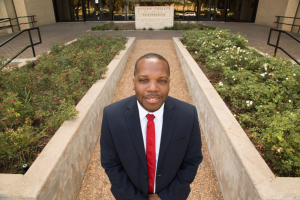Each year INSIGHT Into Diversity, a magazine and website devoted to increasing and embracing diversity in higher education, recognizes leaders from underrepresented groups who are making a difference in the science, technology, engineering and math (STEM) fields with the Inspiring Leaders in STEM Awards. The awardees are chosen based on their success and commitment in launching community-oriented outreach programs and initiatives that engage underrepresented students in the STEM fields.
“These men and women work to motivate and encourage the next generation of young people to pursue STEM education and careers via teaching, mentoring, research and groundbreaking discoveries and innovations,” according to INSIGHT.
Only 40 individuals were chosen to receive the honor, including UH Engineering’s own Jerrod Henderson, one of the leaders of the Cullen College’s efforts to increase student success and retention through the use of innovative academic success strategies geared toward first-generation college students.
First generation, first year success
The United States might boast one of the highest college attendance rates in the world but, according to the Pell Institute for the Study of Opportunity in Higher Education, large gaps remain in college success with only 11 percent of first-generation students earning an undergraduate degree compared to 55 percent of their peers, in a recent measurement period.
In the Cullen College, out of 3,700 enrolled undergraduates, 971 are first-generation students, or just over one-fourth.
Being a first-year engineering student at the Cullen College means one thing: You will be a part of the First Year Experience Program and you will be required to take two courses – Introduction to Engineering (ENGI 1100) and Computing & Problem Solving (ENGI 1331).
That one-two punch right out of the gate is all about laying the proper foundation. That’s the mission of the First Year Experience, to improve student success and retention in upper level engineering courses.
“The point of these courses is to teach students problem-solving strategies and to expose them to different engineering fields so they are better equipped to decide what kind of engineer they’d like to become,” said Henderson, also an instructional assistant professor of chemical engineering. “A new student may not exactly know yet.”
“What we find,” Henderson continued, “is first-generation students haven’t had some of the opportunities we’re providing in the First Year Experience like study groups or tutors.”
He knows firsthand.
“I am a first-generation college student, and so it’s a part of my passion,” said Henderson. “I’m also an ethnic minority who achieved a Ph.D. in engineering, putting me in about the 1.5 to 2 percent category of black males to obtain that degree.”
College was encouraged in Henderson’s close-knit North Carolina community. His parents shared with him the recognizable parental refrain: Do better than us.
“So they pushed,” he said. And he succeeded. Now it’s his turn to push.
“I believe strongly in student success and getting students through the first year, which is so crucial to their success as engineering students,” said Henderson.
And if the back-to-back courses aren’t enough to set a student on the path forward, there is always the “PROMES.”
PROMES
PROMES (pronounced “promise”) seems a fitting name for this acronym (and homophone of promise), its real title the Program for Mastery in Engineering Studies. Its concept is to help students grasp tough engineering concepts and study skills early. It’s one of the most enduring academic programs, having formed in the early 1970’s to help underrepresented minority students.
But most importantly, Henderson says, it offers a community for students who can get easily lost.
“PROMES is open to all students and serves as a community and guide for students who want to be successful,” said Henderson. The program offers a PROMES section of ENGI 1100, requiring them to go the extra mile.
They must attend the career fair and work on an ‘elevator pitch’ about themselves, and take workshops like the “Guaranteed 4.0 Learning System,” developed by an engineer. It teaches mastery of study and skills to do your best work, and if you don’t make the 4.0, the author of the program pays you $100.
Who said engineering couldn’t be immediately lucrative?
Engineering student success
Henderson arrived at the UH Cullen College in 2016 after co-founding the St. Elmo Brady STEM Academy – an educational intervention aimed at exposing underrepresented fourth- and fifth- graders to hands-on, inquiry-based STEM activities – at the University of Illinois Urbana-Champaign.
“Creating opportunities for our students to become successful and nurturing their success along the way is critical to the long-term outlook for our students, the Cullen College and the engineering ranks at-large,” said Joseph W. Tedesco, Elizabeth D. Rockwell Dean of the Cullen College of Engineering. “Before we launch the next generation of great engineers, we foster their ability to learn and belong in our engineering community. These are lifelong skills they will take with them.”
“I couldn’t be prouder of Dr. Henderson for earning this tremendous and well-deserved honor,” he added.
About the magazine
Established over 40 years ago, INSIGHT Into Diversity is the oldest and largest diversity magazine and website in higher education, connecting potential employees with institutions and businesses choosing to embrace a workforce more reflective of our local and national communities.
